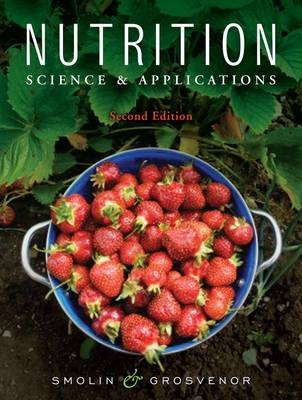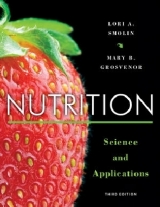
Nutrition
John Wiley & Sons Inc (Verlag)
978-0-470-52474-9 (ISBN)
- Titel erscheint in neuer Auflage
- Artikel merken
Nutrition: Science and Applications, 2e helps students develop the scientific understanding to support their personal and professional decisions. Using a critical thinking approach, Smolin brings nutrition out of the classroom and allows students to apply the logic of science to their own nutrition concerns – both as consumers and as future scientists and health professionals. The text and WileyPLUS course has been developed through a collaboration between the authors and the Nutrition Advisory Board, a team of dedicated nutrition instructors who help review and develop all of Wiley’s nutrition resources. WileyPLUS
Different learning styles, different levels of proficiency, different levels of preparation—each of your students is unique. WileyPLUS empowers them to take advantage of their individual strengths: Students receive timely access to resources that provide immediate feedback and remediation when needed, integrated multi-media resources—including audio and visual exhibits, demonstration problems provide multiple study-paths to fit each student’s learning preferences and encourage more active learning, many opportunities for self-assessment linked to the relevant portions of the content.
WileyPLUS empowers faculty with the tools and resources you need to make your teaching even more effective: customize your classroom presentation with a wealth of resources and functionality from PowerPoint slides to a database of rich visuals, identify those students who are falling behind and intervene accordingly, simplify and automate tasks such as student performance assessment, creating assignments by learning objective, reporting outcomes of groups or individuals.
WileyPLUS is a powerful online tool that provides instructors and students with an integrated suite of teaching and learning resources in one easy-to-use website. Organized around learning objectives, WileyPLUS allows instructors to assign homework and quiz questions that help students achieve specific learning outcomes. A learning styles survey, developed by Wiley and the Institute for Learning Styles research, allows students to discover their blend of learning styles. WileyPLUS resources and general study tips for each learning style are provided. Resources, such as How It Works animations, have been developed specifically to strengthen student understanding of the most difficult topics in Nutrition. These animations break difficult processes into manageable modules. These animations have been developed by the Nutrition Advisory Board and are available, along with a host of other tools in WileyPLUS.
Visualizing Nutrition comes packaged with Grosvenor & Smolin's Nutritient Composition of Foods ISBN: 9780470555019.
1 Nutrition: Food for Health. Nutrition and the Modern Diet.
Food Provides Nutrients.
Food Choices for a Healthy Diet.
Understanding Science Helps Understand Nutrition.
Nutrition Research.
Sorting Out Nutrition Information.
APPLICATIONS.
Summary.
Review Questions.
References.
2 Nutrition Guidelines: Applying the Science of Nutrition.
Nutrition Recommendations for the Modern Diet.
Dietary Reference Intakes.
The Dietary Guidelines for Americans.
MyPyramid: Applying the Dietary Guidelines.
Food and Supplement Labels.
Other Guidelines.
APPLICATIONS.
Summary.
Review Questions.
References.
3 Digestion, Absorption, and Metabolism.
Food Becomes Us.
An Overview of the Digestive System.
Digestion and Absorption.
Digestion and Health.
Transporting Nutrients to Body Cells.
Metabolism of Nutrients: An Overview.
Elimination of Metabolic Wastes.
APPLICATIONS.
Summary.
Review Questions.
References.
4 Carbohydrates: Sugars, Starches, and Fiber.
Carbohydrates in the Modern Diet.
Simple and Complex Carbohydrates.
Your Choice Choosing Whole Grains.
Carbohydrates in the Digestive Tract.
Carbohydrates in the Body.
Blood Glucose Regulation.
Carbohydrates and Health.
Meeting Carbohydrate Recommendations.
APPLICATIONS.
Summary.
Review Questions.
References.
5 Lipids.
Fat in the Modern Diet.
Types of Lipid Molecules.
Lipids in the Digestive Tract.
Lipid Transport in the Body.
Lipid Functions in the Body.
Lipids and Health.
Meeting Recommendations for Fat Intake.
APPLICATIONS.
Summary.
Review Questions.
References.
6 Proteins and Amino Acids.
Protein in the Modern Diet.
Protein Molecules.
Protein in the Digestive Tract.
Protein in the Body.
Protein, Amino Acids, and Health.
Meeting Protein Needs.
Meeting Needs with a Vegetarian Diet.
APPLICATIONS.
Summary.
Review Questions.
References.
7 Energy Balance and Weight Management.
The Obesity Epidemic.
Exploring Energy Balance.
Estimating Energy Needs.
Body Weight and Health.
Guidelines for a Healthy Body Weight.
Regulation of Energy Balance.
Why Are Americans Getting Fatter?
Genes Versus Lifestyle.
Achieving and Maintaining a Healthy Body Weight.
Diets, Diets, Everywhere.
Weight-Loss Drugs and Surgery.
APPLICATIONS.
Summary.
Review Questions.
References.
8 The Water-Soluble Vitamins.
What are Vitamins?
Thiamin.
Riboflavin.
Niacin.
Biotin.
Pantothenic Acid.
Vitamin B6.
Folate or Folic Acid.
Vitamin B12.
Vitamin C.
Choline: Is It a Vitamin?
APPLICATIONS.
Summary.
Review Questions.
References.
9 The Fat-Soluble Vitamins.
Fat-Soluble Vitamins in the Modern Diet.
Vitamin A.
Vitamin D.
Vitamin E.
Vitamin K.
APPLICATIONS.
Summary.
Review Questions.
References.
10 Water and the Electrolytes.
Water: The Internal Sea.
Electrolytes: Salts of the Internal Sea.
Hypertension.
APPLICATIONS.
Summary.
Review Questions.
References.
11 Major Minerals and Bone Health.
What Are Minerals?
Calcium.
Calcium and Bone Health.
Phosphorus.
Magnesium.
Sulfur.
APPLICATIONS.
Summary.
Review Questions.
References.
12 The Trace Elements.
Trace Elements in the Modern Diet.
Iron (Fe).
Zinc (Zn).
Copper (Cu).
Manganese (Mn).
Selenium (Se).
Iodine (I).
Chromium (Cr).
Fluoride (F).
Molybdenum (Mo).
Other Trace Elements.
APPLICATIONS.
Summary.
Review Questions.
References.
13 Nutrition and Physical Activity.
Exercise, Fitness, and Health.
Exercise Recommendations.
Fueling Exercise.
Energy and Nutrient Needs for Physical Activity.
Fluid Needs for Physical Activity.
Food and Drink to Maximize Performance.
Ergogenic Aids: Do Supplements Enhance Athletic Performance?
APPLICATIONS.
Summary.
Review Questions.
References.
14 Nutrition During Pregnancy and Lactation.
The Physiology of Pregnancy.
The Nutritional Needs of Pregnancy.
Factors that Increase the Risks of Pregnancy.
Lactation.
The Nutritional Needs of Infancy.
Feeding the Newborn.
APPLICATIONS.
Summary.
Review Questions.
References.
15 Nutrition from Infancy to Adolescence.
Starting Right for a Healthy Life.
Nourishing Infants, Toddlers, and Young Children.
Nutrition and Health Concerns in Children.
Adolescents.
Special Concerns of Teenagers.
APPLICATIONS.
Summary.
Review Questions.
References.
16 Nutrition and Aging: The Adult Years.
What Is Aging?
What Causes Aging?
Nutritional Needs and Concerns of Older Adults.
Factors that Increase the Risk of Malnutrition.
Keeping Older Adults Healthy.
APPLICATIONS.
Summary.
Review Questions.
References.
17 Food Safety.
How Can Food Make Us Sick?
Keeping Food Safe.
Pathogens in Food.
Chemical Contaminants in Food.
Food Technology.
APPLICATIONS.
Summary.
Review Questions.
References.
18 World Hunger and Malnutrition.
The Two Faces of Malnutrition.
The Cycle of Malnutrition.
Causes of Undernutrition.
Eliminating World Hunger.
Hunger at Home.
APPLICATIONS.
Summary.
Review Questions.
References.
Appendices.
A Additional DRI Tables.
B Standards for Body Size.
C Normal Blood Values of Nutritional Relevance.
D Sources of Information on Nutrition.
E Canadian Nutritional Recommendations and Guidelines.
F World Health Organization Nutrition Recommendations.
G U.S. Nutrition Recommendations.
H Ethnic and Alternative Pyramids for Diet and Lifestyle Planning.
I Exchange Lists.
J Food Labeling Information.
K Energy Expenditure for Various Activities.
L Chemistry, Metabolism, and Structures.
M Critical Thinking Answers.
N Calculations and Conversions.
Glossary.
Index.
| Erscheint lt. Verlag | 18.12.2012 |
|---|---|
| Verlagsort | New York |
| Sprache | englisch |
| Maße | 222 x 292 mm |
| Gewicht | 1905 g |
| Einbandart | gebunden |
| Themenwelt | Medizin / Pharmazie ► Gesundheitsfachberufe ► Diätassistenz / Ernährungsberatung |
| Naturwissenschaften ► Biologie ► Allgemeines / Lexika | |
| ISBN-10 | 0-470-52474-X / 047052474X |
| ISBN-13 | 978-0-470-52474-9 / 9780470524749 |
| Zustand | Neuware |
| Haben Sie eine Frage zum Produkt? |
aus dem Bereich



